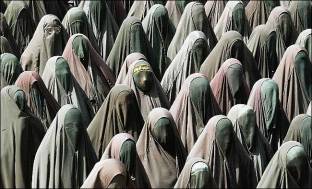The Parable:
Twin girls were born and grew to be lovely young women. The first wedded a powerful Emperor in a far away Empire. The second married a Merchant Prince who was the most wealthy and powerful man in his own land.
The Emperor shortly died. The Wife of the Emperor became the new Empress. She was the most powerful person in the Empire. Yet, misfortune befell her. She had an accident, one that burned her entire face. It scarred and disfigured her. The Merchant Prince also died. The Wife of the Merchant Prince was afflicted with leprosy. There was no treatment; skin and fingers fell off, she developed ulcers and even lost her nose. She was completely hideous, like a corpse. Still, she was the new Merchant Princess. She was the most wealthy and powerful woman in all of her lands.
Despite her disfigurement, citizens of the Empire came to visit the Empress. They professed their love for her and swore they would be forever her subjects. They knew she was perfect and that she was the most beautiful woman alive. She won every beauty pageant in the Empire.
The Merchant Princess was hailed for her beauty in her own lands as well. Her devotees came to supplicate at her leprous feet. Statues were erected – not depicting her as a beautiful woman, but as she was – covered in sores, missing fingers and without a nose. Yet, those loyal to her declared this was true beauty. They knew she was, truly, the most beautiful woman alive.
Citizens of the Empire found the devotees of the Merchant Princess confusing: “Why do they claim this Princes is the most beautiful? Do they not see she is leprous, covered in sores and has no nose?”
The devotees of the Merchant Princess felt the same way: “The citizens of the Empire must be blind. Their Empress is a burn victim; her face is hardly human. Is not our Merchant Princess truly the most beautiful?”
The Meaning:
The Empress and the Merchant Princess are Islam and Christianity. The Muslim has no difficulty seeing the flaws in Christianity, yet refuses to acknowledge that identical flaws exist in his own faith. The Christian critiques Islam, ignoring that its own text and history is identical – nay, even more barbaric – in every way. They are able to see the ugliness in the other faith, but have deceived themselves into seeing beauty in their own. Both have told the lie for so long that they mistake what is truly hideous for what is truly beautiful. Both are correct in their perceptions of the opposing faith, but wrong in their perceptions of their own faith.
The Christian justifies accounts of genocide, slavery, oppression and torture – all as a part of God’s divine plan, all in the Bible, all practiced by Christians throughout Christian history. The Muslim, similarly, carries out barbarisms under the banner of Allah. Both assert an inerrant, divine origin for a clearly flawed, man-made text. Both dismiss growth and progress in lieu of religious dogma.
Both coerce with fear; the promise of a divine reward for those who submit and the threat of a divine punishment for those who refuse to do so.
They are the Empress and the Merchant Princess. Belief is propagated by the group. The Empress wields the threat of temporal power to ensure adherence. The Merchant Princess promises gold for her devotees and threatens poverty for those who hesitate to kowtow.

